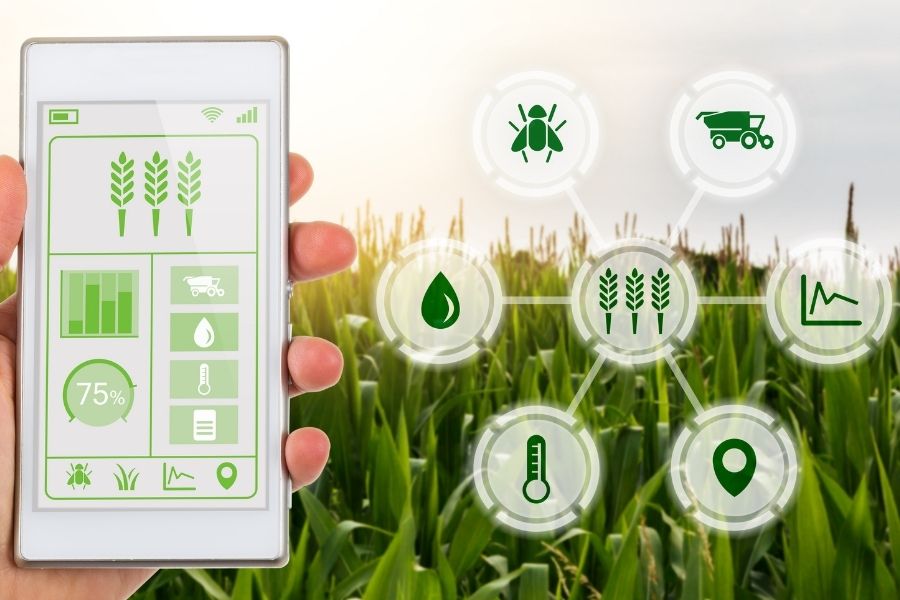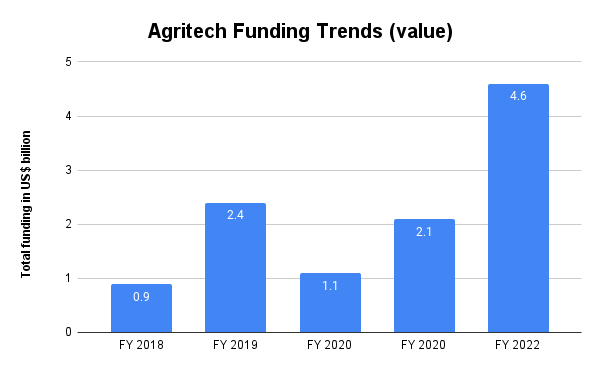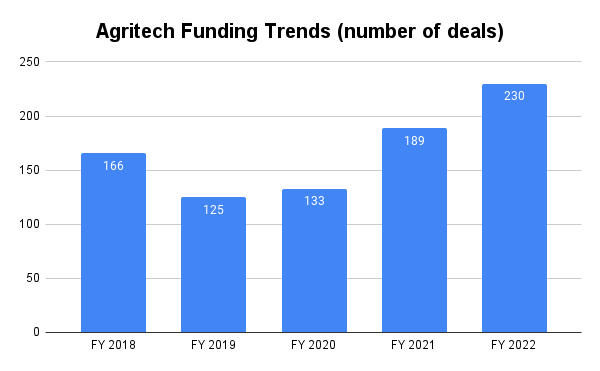Agritech Exports – Opportunity for being Vishwaguru of global south
India’s diverse agricultural landscape has earned it the reputation of a global agricultural powerhouse. Off late, the booming Indian agritech industry has captured the attention of investors.
Agrifoodtech received US$ 4.6 billion as funding in the year 2022 and the market is projected to grow to US$ 35 billion by 2027, with a current penetration less than 1%.
According to the Economic Survey of India 2022-23, the country’s agricultural sector has experienced a growth of 4.6% in the last six years, and fuelled over 1000 agri-tech startups. In view of the same, Ninjacart’s Co-Founder & CEO, Kartheeswaran KK, recently shared his views with IBT on India’s growth potential and challenges in this sunrise sector.

Image Credit: Shutterstock

Source: India AgriFoodTech Investment Report 2022
Many incubators in the agri sector are being run by ICAR, MANAGE, NAARM, etc. Schemes like Rashtriya Krishi Vikas Yojana (RKVY) also fund startups with grants. These are creating many startups in the agritech sector. The announcement of an agri accelerator fund of Rs. 500 crores in Budget 2023-24 is testament to their contribution to the agriculture sector.
While there is no clear definition of this segment, it broadly covers software and hardware-led products like sensors, precision agri devices, AI-based machines, drones, advisory systems, etc. From this, we can see the huge shift in tech towards electronics & IT. They solve critical issues in the agriculture value chain like efficient market linkages, quality inputs, reduction of wastage, timely advisories, access to financial products, etc.

Source: India AgriFoodTech Investment Report 2022
According to the Agtech Overview 2022 by Pitch Deck, the market size for agriculture finance & e-commerce grew to US$ 29.2 billion in 2022. It forecasts the market to grow at a 7.8% CAGR to reach US$ 39.4 billion by 2026 and that of precision agriculture to reach US$ 7 billion in 2022 and further at a CAGR of 11.8% to reach US$ 10.9 billion by 2026. This is a huge global market for agritech solutions. A lot has been written about the actual or potential contribution of agritech to the Indian agriculture sector and the different stakeholders involved in it like farmers, financial institutions, traders, consumers, etc.
The main achievement of these companies has been to develop products and services that would work in what is described as “Indian conditions”. This is an overarching term that summarises aspects of Indian agriculture like smallholder farms, high levels of dependence on informal sources of finance, connectivity issues, etc. This aspect is very significant as historically, the cutting-edge agri technologies of the West were found to be unsuitable for the conditions in India.
However, it needs to point out that many countries in the global south are similarly placed and technologies developed in India could be used there. For example, the land held by farmers in India is very small and many countries in Africa, SE Asia & Latin America share similar characteristics. So the technologies that are developed in India can be useful to farmers in those countries and also help modernise and digitise their food systems.
The main problem highlighted by agri commodity exporters from India has been with respect to a stable regulatory environment in India. Frequent trade restrictions have been a dampener in the growth of agri-commodity exports. Moreover, trade in agri commodities is also a politically sensitive issue due to its link with food security and the welfare of farmers who constitute a large section of citizens in developing countries. It’s not that there is no scope for agri-commodity exports, but othere would be significant challenges.
India is uniquely placed among the Global South with respect to its tech capabilities. I personally have heard this from multiple startups in Africa & SE Asia when they reached out to us looking for the technology that we have built. We had the privilege of hosting a few startup teams at our office in Bengaluru. With recent initiatives in electronics manufacturing, there has been a spurt in the growth. With these strengths, India is well placed to support the global south with its agritech capabilities.
Indian startups can contribute significantly to the increase in productivity and prevent food loss in other developing countries. With technologies that are in tune with ground realities and costs expected to be much lower, Indian agritechs have the potential to play a critical role in transforming the food systems in these countries. These would also help drive SDG goals in these countries to a great extent. This aspect is critical as it helps the importing country to access huge global funds available for achieving these goals. It will help them fund the purchase and implementation of the technology.
Many Indian companies like Cropin, Satsure, and Agnext have created or are in the process of creating a global market for their technology platforms while serving within India also. Companies like Ninjacart and Waycool, which have years of experience in running tech-driven supply chains in India are now looking forward to selling their technologies to other startups abroad. So the promotion of agritech as a specialized segment for exports needs to receive focus in the coming years.
Promoting agritech exports can have benefits not only for farmers in other countries but also for Indian farmers through reduced prices resulting from economies of scale. Currently, the agritech industry works closely with the Ministry of Agriculture, with a focus on the benefits to Indian farmers. However, within the larger IT or electronics ecosystem, this sector receives relatively little attention despite its potential as an emerging industry. To address this, export promotion councils can take an active role in promoting agritech exports, either as part of their agricultural or IT/electronics promotion activities.
India has the potential to become a leader in agritech exports, and it is necessary to make a collective effort to promote this opportunity to establish the country as a Vishwaguru, or a global leader, in the field of agriculture.

Kartheeswaran KK, Co-Founder & CEO, Ninjacart co-founded the company in 2015 as a B2C hyperlocal grocery delivery platform along with other cofounders. He holds a BE in Computer Science from the College of Engineering, Guindy and an MBA from IIM Ahmedabad. Prior to joining Ninjacart, he worked at Taxi4Sure and Microsoft. Views expressed are personal.













Leave a comment